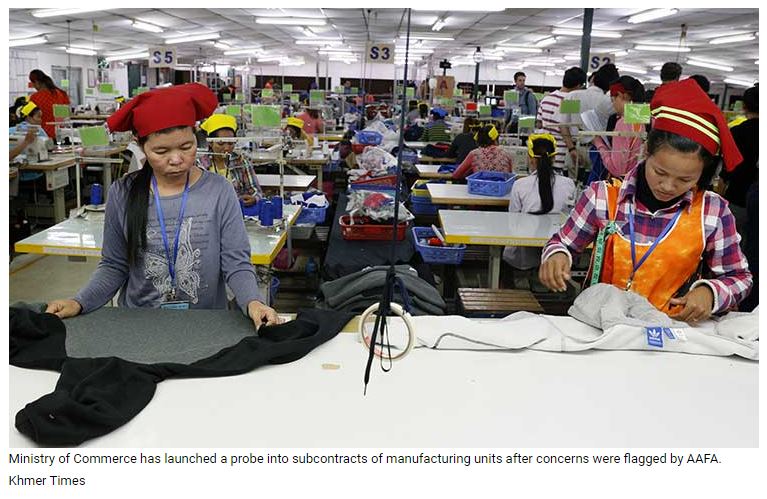Cambodia: Gov’t probes garment, textile, footwear manufacturing subcontracts
The commission for manufacturing subcontract management in the garment and textile industry under the Ministry of Commerce (MoC) has launched an investigation into the business agreements after concerns were flagged by the American Apparel & Footwear Association (AAFA) over the alleged abuse of labour principles, said a senior official of MoC.
AAFA represents more than 1,000 world-famous brands, retailers and manufacturers. It is the trusted public and political voice of the apparel and footwear industry based in Washington DC and with a presence across the globe.
Talking to Khmer Times yesterday, an MoC official said that the commission held its first meeting with representatives of the US-based association – AAFA – on Thursday last week, to address their concerns over possible cases of abuse of labour principles in implementing manufacturing subcontracts between international buyers and manufacturers in Cambodia.
Sok Sopheak, MoC’s Secretary of State, told Khmer Times that the commission arranged meetings to address AAFA’s concerns about forced, unclean or under-aged labour or others prohibited by laws that could be practised in manufacturing apparel, textile and footwear for exporting to countries that are its members’ markets.
“We would go down to find the truth and examine documents, do necessary investigation and question manufacturers to provide answers to us and prove that they did not flout the established rules. We shall provide the AAFA with clarifications, said Sopheak, who is also the chairman of the commission for sub-contract management in the garment and textile industry.
Sopheak also pointed out that AAFA is comprised of many members who are importers and buyers of apparel, textile and footwear products from different places all over the world and they are multinational companies. “They usually buy these goods from places for profits,” said Sopheak, who chaired the meeting attended by officials from other ministries.
The first meeting with AAFA’s representatives was also attended by officials from the Ministry of Labour and Vocational Training, Ministry of Interior, General Department of Prisons, Correctional Centres 1 and 2 and many other members of the commission for manufacturing sub-contract management in garment and textile industry in Cambodia.
“We would go down and check places that are suspicious. We cannot come to any conclusion with a single visit. There are mechanisms to follow depending on relevant documents including subcontracts. All these cannot be revealed to the news consumption as they are procedures to be followed for investigation,” Sopheak said cautiously.
Subcontracting refers to making a contract between a person or a group of people who are in need of external assistance or outsources to manufacture or produce goods for their clients or buyers and another person or group of people who provide those assistance or outsourcing services for a period of time at an agreed fee, which is enumerated in the civil code, Sopheak explained.
“They are concerned about forced, unclean or under-aged labour or others that are prohibited by the laws concerned and its possible involvement in manufacturing for exporting or importing. They are our buyers, but if the goods are manufactured in unhygienic conditions, they would not make purchases from us as they represent importers from most places in the world,” he said.
AAFA has more than three million US workers and contributes $470 billion annually in US retail sales. It stretches from Washington DC to across the globe.
AAFA provides exclusive expertise—and drives progress—across the supply chain and sourcing; trade, logistics and manufacturing; and brand protection to help its members navigate the complex regulatory environment and lower costs. Members gain unparalleled access to information and exclusive insights on regulation and policy, and premier opportunities for networking and collaboration.
The outcome of the first meeting would be compiled as a report and submitted to Sar Kheng, Deputy Prime Minister and Minister of Interior and Minister of Labour and Vocational Training, said the MoC release on Friday last week, adding that the investigation results would be submitted at the commission’s next meetings.
“Members of the commission have participated in responding to challenges and suggestions with high responsibility in consistence with the policy of the government that prohibits employing labour of imprisoned persons to manufacture goods for export,” the release pointed out, adding that a protocol will be prepared for the commission to comply with the future needs.
AAFA stands at the forefront as a leader in positive change for the apparel and footwear industry. With integrity and purpose, AAFA delivers a unified voice on key legislative and regulatory issues. AAFA enables a collaborative forum to promote best practices and innovation. AAFA’s comprehensive work ensures the continued success and growth of the apparel and footwear industry, its suppliers, and its customers.
“For example, I am seeking to buy rice paddy from someone, but that person uses intimidation on farmers and he or she wants to sell those rice paddy to me. If I am aware of these actions, I would not want to make profit from such actions of doing business because I want to make profits from the sale of goods that are clean and fairly produced with integrity,” Sopheak said.
Source: https://www.khmertimeskh.com/501241503/govt-probes-garment-textile-footwear-manufacturing-subcontracts/


 English
English




